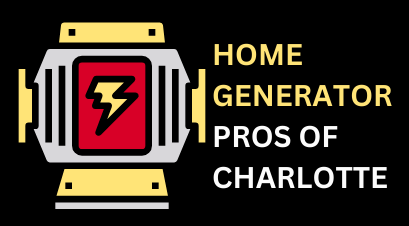
Whole House Generators in Derita NC
A whole house generator is a backup power system designed to automatically supply electricity to your entire home during a power outage. Unlike portable generators that power only select appliances, whole house generators connect directly to your home’s electrical system, ensuring that all essential systems, such as heating, cooling, lights, and even major appliances, continue to operate seamlessly when the main power supply fails.
Why Having a Generator Is Essential for Homes
Storms and power outages can be unpredictable, a whole house generator is more than a convenience—it's a necessity. These generators ensure that your home remains functional during power interruptions, safeguarding your family’s comfort, safety, and security. Whether you’re dealing with a severe storm, a grid failure, or routine maintenance that takes the power offline, a whole house generator guarantees that your daily life isn’t disrupted.
Examples of Situations Where It Is Crucial
Several scenarios demonstrate the importance of having a whole house generator:
- Severe Storms: Thunderstorms, hurricanes, or heavy snowstorms can cause prolonged power outages. A whole house generator keeps your home warm in winter, cool in summer, and ensures that essential devices like sump pumps and medical equipment remain operational.
- Health Needs: For families with members who rely on medical equipment such as oxygen tanks, ventilators, or refrigerators for storing medication, uninterrupted power is critical.
- Remote Work: With more people working from home, a power outage can mean missed deadlines or lost income. A whole house generator ensures that your work doesn’t come to a halt when the power goes out.
- Food Preservation: Prolonged power outages can lead to food spoilage. A whole house generator keeps your refrigerator and freezer running, saving you the cost of replacing spoiled groceries.

We will get back to you as soon as possible.
Please try again later.
Factors to Consider When Choosing a Whole House Generator
When selecting a whole house generator, consider these factors:
- Power Needs: Assess the wattage required to power your entire home, including all essential appliances and systems.
- Fuel Type: Whole house generators typically run on natural gas, propane, or diesel. Choose a fuel type based on availability, cost, and your preference.
- Size and Capacity: The size of the generator should match your home’s power needs. Larger homes with more appliances will require a generator with greater capacity.
- Noise Level: Consider the generator's noise level, especially if you live in a quiet neighborhood. Some models are designed to be quieter than others.
- Budget: Whole house generators are a significant investment. Determine your budget, including installation and maintenance costs, before making a decision.
How It Works
A whole house generator operates automatically. It is connected to your home’s electrical system and monitors the power supply. When it detects a power outage, it starts within seconds, supplying electricity to your home. Once the main power is restored, the generator shuts down automatically and returns to standby mode, ready for the next outage. This seamless transition ensures that you and your family are never left in the dark.
Different Types
There are several types of whole house generators, each suited to different needs:
- Standby Generators: These are permanently installed outside your home and are connected to your home’s electrical system. They run on natural gas or propane and are the most common type of whole house generator.
- Portable Generators: Although not typically considered “whole house” generators, some high-capacity portable models can power multiple systems in your home. However, they require manual setup and are less convenient than standby generators.
- Inverter Generators: These generators are quieter and more fuel-efficient than traditional models. They are ideal for homes that need power for sensitive electronics, as they produce cleaner power.
Installation Process
Installing a whole house generator involves several steps:
- Assessment: A professional will assess your home’s power needs and determine the best location for the generator.
- Permitting: Depending on local regulations, you may need permits before installation. Your contractor will help with this process.
- Installation: The generator is installed on a concrete pad outside your home and connected to your home’s electrical system. It is also connected to your fuel supply, whether natural gas, propane, or diesel.
- Testing: Once installed, the generator is tested to ensure it works correctly and will automatically kick in during a power outage.
- Inspection: A final inspection may be required by local authorities to ensure the installation meets all safety standards.
Maintenance and Care
Proper maintenance is crucial for the reliable operation of your whole house generator. Regular maintenance tasks include:
- Oil and Filter Changes: Like any engine, the generator's engine requires regular oil and filter changes to keep it running smoothly.
- Battery Check: The generator’s battery should be checked regularly to ensure it is fully charged and ready to start the generator when needed.
- Fuel System Inspection: The fuel supply should be inspected for leaks or other issues.
- Test Runs: Running the generator for a short period each month ensures that it is functioning correctly and will be ready when needed.
- Professional Servicing: Annual servicing by a professional can help identify and address any potential issues before they become serious problems.
Warranty and Support
Most whole house generators come with a manufacturer’s warranty that covers parts and labor for a specific period. Warranties typically range from 2 to 10 years, depending on the brand and model. It’s essential to understand the terms of your warranty, including what is covered and what is not. In addition to the warranty, reliable customer support is crucial. Choose a generator from a company known for excellent customer service and support, so you can get help quickly if an issue arises.
What We Offer
We specialize in providing top-quality
whole house generators in Derita, NC. Our services include:
- Residential Generators
- Commercial Generators
- Portable Generators
- Electric Generators
- Propane Generators
- Solar Generators
- Generator Repairs
- Generator Maintenance
- Generator Parts
If you’re ready to protect your home from power outages with a reliable whole house generator, contact us today. Our team is here to answer any questions you have and help you choose the perfect generator for your home. Don’t wait until the next power outage—get in touch with us now to schedule a consultation and take the first step toward uninterrupted power.
Let's Connect!
Don't get caught in the dark during the next power outage. We offer top-notch generator installation services to keep your home or business running smoothly no matter what. Our team specializes in emergency backup generators, ensuring that your power stays on even in the most severe weather conditions. Worried about the cost? We understand that buying a standby generator is a significant investment, which is why we offer fair and competitive pricing. Let us help you protect your home or business by hiring us for your generator installation needs.